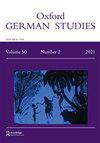Laozi Through the Lens of the White Rose: Resonance or Dissonance?
IF 0.1
3区 文学
0 LITERATURE, GERMAN, DUTCH, SCANDINAVIAN
引用次数: 0
Abstract
A surprising feature of the White Rose anti-Nazi resistance pamphlets is their appeal to a foundational classical Chinese text, the Laozi (otherwise known as the Daodejing), to buttress their critique of fascism and authoritarianism. I argue that from the perspective of a 1942 educated readership, the act of quoting the Laozi functioned as a subtle and pointed nod to anti-fascist intellectuals in pre-war Germany, many of whom had interpreted the Laozi as an anti-authoritarian and pacifist text. To a sympathetic reader, the Laozi therefore constituted an apt reference point for critiquing National Socialism. I then introduce a complication for this wartime reading of the Laozi from the perspective of its ambiguous reception in ancient Chinese political thought. I more specifically discuss an ancient line of interpretation of the Laozi that points in the direction of authoritarianism — in stark tension with the White Rose message of passive resistance and popular revolt.白玫瑰镜头下的老子:共鸣还是不和谐?
白玫瑰反纳粹宣传册的一个令人惊讶的特点是,他们引用了中国经典经典《老子》(也被称为《道德经》)来支持他们对法西斯主义和威权主义的批评。我认为,从1942年受过教育的读者的角度来看,引用《老子》的行为是对战前德国反法西斯知识分子的一种微妙而尖锐的认可,他们中的许多人将《老子》解读为反专制和和平主义的文本。因此,对于富有同情心的读者来说,《老子》是批判国家社会主义的恰当参考。然后,我从中国古代政治思想对《老子》模棱两可的接受的角度,介绍了这种战时阅读的复杂性。我更具体地讨论了对老子的一种古老的解释,它指向威权主义的方向——与白玫瑰所传达的被动抵抗和民众反抗的信息截然相反。
本文章由计算机程序翻译,如有差异,请以英文原文为准。
求助全文
约1分钟内获得全文
求助全文
来源期刊

OXFORD GERMAN STUDIES
LITERATURE, GERMAN, DUTCH, SCANDINAVIAN-
CiteScore
0.10
自引率
50.00%
发文量
2
期刊介绍:
Oxford German Studies is a fully refereed journal, and publishes in English and German, aiming to present contributions from all countries and to represent as wide a range of topics and approaches throughout German studies as can be achieved. The thematic coverage of the journal continues to be based on an inclusive conception of German studies, centred on the study of German literature from the Middle Ages to the present, but extending a warm welcome to interdisciplinary and comparative topics, and to contributions from neighbouring areas such as language study and linguistics, history, philosophy, sociology, music, and art history. The editors are literary scholars, but seek advice from specialists in other areas as appropriate.
 求助内容:
求助内容: 应助结果提醒方式:
应助结果提醒方式:


